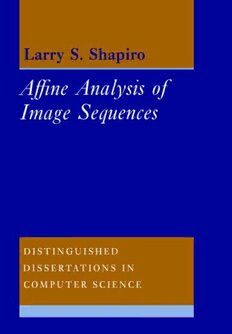Download Affine Analysis of Image Sequences (Distinguished Dissertations in Computer Science) PDF Free - Full Version
Download Affine Analysis of Image Sequences (Distinguished Dissertations in Computer Science) by Larry S. Shapiro in PDF format completely FREE. No registration required, no payment needed. Get instant access to this valuable resource on PDFdrive.to!
About Affine Analysis of Image Sequences (Distinguished Dissertations in Computer Science)
Computer vision is a rapidly growing field which aims to make computers 'see' as effectively as humans. In this book Dr Shapiro presents a new computer vision framework for interpreting time-varying imagery. This is an important task, since movement reveals valuable information about the environment. The fully-automated system operates on long, monocular image sequences containing multiple, independently-moving objects, and demonstrates the practical feasibility of recovering scene structure and motion in a bottom-up fashion. Real and synthetic examples are given throughout, with particular emphasis on image coding applications. Novel theory is derived in the context of the affine camera, a generalisation of the familiar scaled orthographic model. Analysis proceeds by tracking 'corner features' through successive frames and grouping the resulting trajectories into rigid objects using new clustering and outlier rejection techniques. The three-dimensional motion parameters are then computed via 'affine epipolar geometry', and 'affine structure' is used to generate alternative views of the object and fill in partial views. The use of all available features (over multiple frames) and the incorporation of statistical noise properties substantially improves existing algorithms, giving greater reliability and reduced noise sensitivity.
Detailed Information
| Author: | Larry S. Shapiro |
|---|---|
| Publication Year: | 2005 |
| ISBN: | 9780521550635 |
| Pages: | 224 |
| Language: | English |
| File Size: | 14.011 |
| Format: | |
| Price: | FREE |
Safe & Secure Download - No registration required
Why Choose PDFdrive for Your Free Affine Analysis of Image Sequences (Distinguished Dissertations in Computer Science) Download?
- 100% Free: No hidden fees or subscriptions required for one book every day.
- No Registration: Immediate access is available without creating accounts for one book every day.
- Safe and Secure: Clean downloads without malware or viruses
- Multiple Formats: PDF, MOBI, Mpub,... optimized for all devices
- Educational Resource: Supporting knowledge sharing and learning
Frequently Asked Questions
Is it really free to download Affine Analysis of Image Sequences (Distinguished Dissertations in Computer Science) PDF?
Yes, on https://PDFdrive.to you can download Affine Analysis of Image Sequences (Distinguished Dissertations in Computer Science) by Larry S. Shapiro completely free. We don't require any payment, subscription, or registration to access this PDF file. For 3 books every day.
How can I read Affine Analysis of Image Sequences (Distinguished Dissertations in Computer Science) on my mobile device?
After downloading Affine Analysis of Image Sequences (Distinguished Dissertations in Computer Science) PDF, you can open it with any PDF reader app on your phone or tablet. We recommend using Adobe Acrobat Reader, Apple Books, or Google Play Books for the best reading experience.
Is this the full version of Affine Analysis of Image Sequences (Distinguished Dissertations in Computer Science)?
Yes, this is the complete PDF version of Affine Analysis of Image Sequences (Distinguished Dissertations in Computer Science) by Larry S. Shapiro. You will be able to read the entire content as in the printed version without missing any pages.
Is it legal to download Affine Analysis of Image Sequences (Distinguished Dissertations in Computer Science) PDF for free?
https://PDFdrive.to provides links to free educational resources available online. We do not store any files on our servers. Please be aware of copyright laws in your country before downloading.
The materials shared are intended for research, educational, and personal use in accordance with fair use principles.

